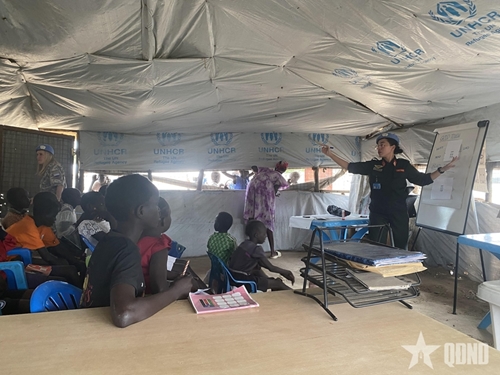More than just teaching a language, they also provide essential life skills, knowledge about hygiene and healthcare, and guidance on how to protect and care for oneself—offering the children hope for a brighter future.
Every Saturday morning, students aged 7 to 13, most of whom have never attended school due to poverty or security concerns, have the chance to attend these classes.
    |
 |
|
Senior Captain Tran Thi Thu Trang at a class |
The children have become close to their two Vietnamese “teachers”: Senior Captain Tran Thi Thu Trang, a police officer, and Senior Captain Nguyen Tien Long, a military officer. Both are serving with the United Nations peacekeeping mission in Bor.
The two young officers have shown deep compassion and a strong sense of responsibility in their commitment to teaching disadvantaged children. Many of the students are internally displaced, having fled conflict with their families and dropped out of school, while others have never learned to read or write.
The lessons go beyond vocabulary and grammar and are designed to be relevant to the children’s daily lives. The officers regularly collaborate to create lesson plans that are easy to understand and remember. Topics such as self-introduction, personal hygiene, and malaria prevention are integrated with soft skills like communication, avoiding sexual violence, and developing healthy personal habits. These are critical in a context where many children have limited awareness, minimal classroom experience, and often lack discipline.
Each session includes interactive games that help the children absorb lessons naturally while providing a safe and joyful space. This playful environment encourages creativity, problem-solving, and helps them relax amid otherwise unstable living conditions.
The class, which began in December 2024, has been maintained despite numerous challenges, relying on self-funded materials from the two Vietnamese officers and support from international colleagues.
    |
 |
|
Senior Captain Nguyen Tien Long teaches local students at a class. |
Senior Captain Nguyen Tien Long said they have done their best to organize the class. With no blackboard or classroom supplies, the teachers had to bring their own pens, notebooks, and drawing materials. Without electricity, classes depended on natural light, and extreme heat or sudden rain posed constant obstacles. Sometimes, they even had to teach while standing in mud. Nevertheless, both officers raced against time, hoping to teach the children as much as possible before the end of their deployment.
Despite the difficulties, both Captains Long and Trang were determined to continue the classes until the conclusion of their mission. Their efforts were recognized and supported by local interpreters, camp officials, and international colleagues.
Above all, their greatest reward came from seeing the bright smiles of children who, for the first time, learned to write their names in English, properly wash their hands, or bravely speak in front of the class about how to protect themselves from harm. These moments inspired the officers to sustain this special classroom.
Senior Captain Tran Thi Thu Trang once said that while they cannot change the children’s circumstances, they believe that even small acts of kindness can offer hope and a path to a better future.
These Vietnamese peacekeepers quietly sow the seeds of knowledge, embodying the broader vision of the U.N. peacekeeping mission, not only to preserve peace but also to help build a better world.
A classroom with no blackboard, no electricity, and no desks has become a fulcrum of empowerment for underprivileged children, showing that peace is not merely the absence of war, but the opportunity to learn, to dream, and to help shape a better society and stronger nation.
Translated by Minh Anh